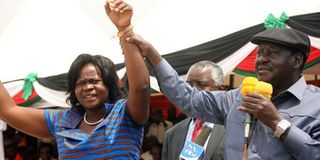The real election issues that call for debate

Cord Leader Raila Odinga endorses Homa Bay Women Rep Gladys Wanga as the Homa Bay County ODM chairlady at Homa Bay Town on January 28, 2016 when he went to officially open Homa Bay airstrip for commercial airplanes. PHOTO | TONY OMONDI | NATION MEDIA GROUP
What you need to know:
- Today we are still discussing what went wrong in the 2013 elections. We know the process, just like in 2007, was flawed.
- Many of these malpractices do not just sabotage democracy. They make a mockery of electioneering and the idea that those leading the country are “representatives” of the citizens.
- Almost three years later, some politicians are now questioning the state of “independence” of the Independent Electoral and Boundaries Commission.
What is your vote worth? What investment do you make – or returns do you expect – when voting for your MCA, Governor, Woman Representative, Senator, MP and President?
At the end of five years, was it worth attending the campaign rallies, contributing time and money, queuing to vote and supporting your party of choice? These are questions few Kenyans ask themselves ahead of the next elections.
Why? Millions of Kenyans vote since they are expected to rather than because they think it is worth their time and effort.
Today we are still discussing what went wrong in the 2013 elections. We know the process, just like in 2007, was flawed. Voting kits malfunctioned, some polling stations had more votes than the registered number of voters, people voted without cards, and returning officers took longer than was legally allowed to declare results.
Many of these malpractices do not just sabotage democracy. They make a mockery of electioneering and the idea that those leading the country are “representatives” of the citizens.
Almost three years later, some politicians are now questioning the state of “independence” of the Independent Electoral and Boundaries Commission.
Claims of planned rigging of the upcoming General Election also assail our ears. Some party activists have declared publicly that all means available will be employed to “win” the elections for their party and regions are being “zoned off”.
But what are some of the real issues around elections that Kenyans should be debating beyond the politicians’ noises? The volume of essays, New Constitution, Same Old Challenges: Reflections on Kenya’s 2013 General Election (2015), edited by Fred Otieno, could be a good starting point.
This book reminds us to look afresh into the run-up to the 2013 General Election, how the election was conducted, the outcomes and disputes, and the consequences for the country. It has 14 chapters dealing with issues ranging from voter registration, campaigns and funding, gender representation, the role of state security agents, and media reporting among others.
In one sense it is an academic book. But in another sense, Reflections on Kenya’s 2013 General Election is about various players.
There are essays that ask questions from a purely speculative position; there are others that do the supposedly cold “scientific” thing of producing figures and calculating percentages; yet there are others which assess the role of various players in the elections.
So, for instance, the essay “See No Evil: Reform and Observation of Kenya’s 2013 Presidential Elections” by Muthoni Wanyeki is a must-read for anyone interested in the question of electoral validity.
She reminds Kenyans that the fairness of elections is something we have to work hard at guaranteeing. She appears worried that we seem to trust observers too much. And last time they betrayed that faith. According to her, they privileged “short-term negative peace and, ultimately, interests over ethics” and endorsed a supposedly flawed process.
INTEGRITY AND ACCOUNTABILITY
Seema Shah writes in the same spirit as Muthoni in “Local versus International Standards of Election Assessment: Kenya’s 2013 General Election”.
She argues that the integrity and credibility of the 2013 elections need worry Kenyans. She shows that the conduct and acts of the IEBC inspired little confidence.
Giving the example of the petition in the Supreme Court over the results of the presidential elections, Shah claims the voters’ register was flawed and, therefore, unreliable. There are also questions on skewed voter registration and toping up of votes.
Money is key to winning an electoral contest nearly everywhere. In Kenya, it is the main difference between losers and winners. Attiya Waris, in “Financing Elections in an Opaque Fiscal Economy: Kenya’s 2013 Elections”, shows how party funding could be money extorted from businesses or donations made as advances in anticipation of the party winning and the subsequent dishing out of procurement contracts.
An essay by Dennis Galava forces Kenyan media houses and journalists to think hard and long whether their partisanship in the 2013 elections through the “peace campaigns” did the country good or betrayed journalistic and democratic ideals.
The writer is a lecturer at the University of Nairobi





